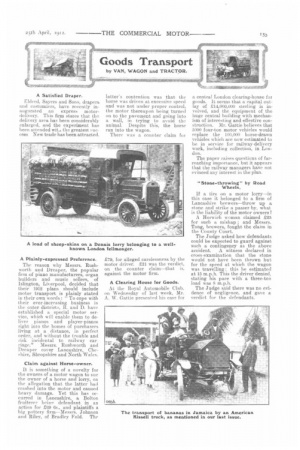Goods Transport
Page 11

If you've noticed an error in this article please click here to report it so we can fix it.
by VAN, WAGON and TRACTOR.
A Satisfied Draper.
Eldred, Sayers and Sons, drapers and costumiers, have recently inaugurated an express motordelivery. This firm states that the delivery area has been considerably enlarged, and the experiment has been attended wit the greatest i-ticCei38 New trade has been attracted.
A Plainly-expressed Preference.
The reason why Messrs. Rushworth and Dreaper, the popular firm of piano manufacturers, organ builders and music sellers, of Islington, Liverpool, decided that their 1912 plans should include motor transport is plainly stated in their own words : To cope with their ever-increasing business in the outer districts, R. and D. have established a special motor service, which will enable them to deliver pianos and player-pianos right into the homes of purchasers living at a distance, in perfect order, and without the trouble and risk incidental to railway carriage.' Messrs. Rushworth and Dreaper cover Lancashire, Cheshire, Shropshire and North Wales.
Claim against Horse-owner.
It is something of a novelty for the owners of a motor wagon to sue the owner of a horse and lorry, on the allegation that the latter had crashed into the motor and caused heavy damage. Yet this has occurred in Lancashire, a Bolton fruiterer beimr defendant in an action for 269 6s., and plaintiffs a big pottery firm—Messrs. Johnson and Riley, of Bradley Fold. The
latter's contention was that the horse was driven at excessive speed and was not under proper control, the motor thereupon being turned on to the pavement and going into a wall, in trying to avoid the animal. Despite this, the horse ran into the wagon.
There was a counter claim for £79, for alleged carelessness by the motor driver. £21 was the verdict, on the counter claim—that is, against the motor firm.
A Clearing House for Goods.
At the Royal Automobile Club. on Wednesday of Iast week, Mr. A. W. Gattie presented his case for
a central London clearing-house f goods. It seems that a capital outlay of 214,000,000 sterling is involved, and the equipment of the huge central building with mechanism of interesting and effective construction. Mr. Cattle believes that 5000 four-ton motor vehicles would replace the 100,000 horse-drawn vehicles which are now estimated to be in service for railway-delivery work, including collection, in London.
The paper raises questions of farreaching importance, but it appears that the railway managers have not evinced any interest, in the plan.
"Stone.-throwing" by Road Wheels, If a tire on a motor lorry—in this case it belonged to a firm of Lancashire brewers—throw up a stone and strike a passer-by. What is the liability of the motor owners?
A Horwieh woman claimed 25 for such a mishap; and Messrs. Tong, brewers, fought the claim in the County Court.
The Judge asked how defendants could be expected to guard against such a contingency as the above accident. A witness declared in cross-examination that the stone would not have been thrown but for the speed at which the wagon was travelling : this he estimated at 15 m.p.h. This the driver denied, stating his pace with a three-ton load was 8 m.p.h.
The Judge said there was no evidence of negligence, and gave a verdict for the defendants.




















